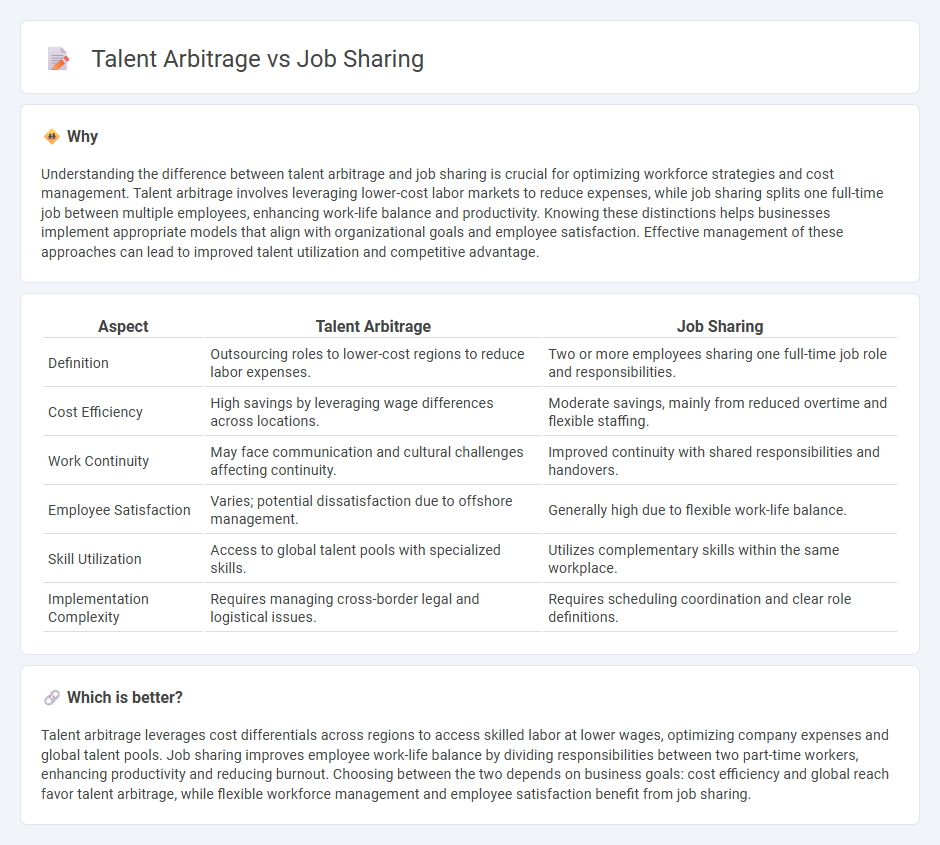
Talent arbitrage leverages global differences in labor costs by outsourcing tasks to lower-wage regions, optimizing company expenses while accessing diverse skill sets. Job sharing involves splitting full-time positions between two or more employees to enhance workforce flexibility and improve work-life balance without increasing payroll costs. Discover how these innovative employment strategies can transform your business model.
Why it is important
Understanding the difference between talent arbitrage and job sharing is crucial for optimizing workforce strategies and cost management. Talent arbitrage involves leveraging lower-cost labor markets to reduce expenses, while job sharing splits one full-time job between multiple employees, enhancing work-life balance and productivity. Knowing these distinctions helps businesses implement appropriate models that align with organizational goals and employee satisfaction. Effective management of these approaches can lead to improved talent utilization and competitive advantage.
Comparison Table
| Aspect | Talent Arbitrage | Job Sharing |
|---|---|---|
| Definition | Outsourcing roles to lower-cost regions to reduce labor expenses. | Two or more employees sharing one full-time job role and responsibilities. |
| Cost Efficiency | High savings by leveraging wage differences across locations. | Moderate savings, mainly from reduced overtime and flexible staffing. |
| Work Continuity | May face communication and cultural challenges affecting continuity. | Improved continuity with shared responsibilities and handovers. |
| Employee Satisfaction | Varies; potential dissatisfaction due to offshore management. | Generally high due to flexible work-life balance. |
| Skill Utilization | Access to global talent pools with specialized skills. | Utilizes complementary skills within the same workplace. |
| Implementation Complexity | Requires managing cross-border legal and logistical issues. | Requires scheduling coordination and clear role definitions. |
Which is better?
Talent arbitrage leverages cost differentials across regions to access skilled labor at lower wages, optimizing company expenses and global talent pools. Job sharing improves employee work-life balance by dividing responsibilities between two part-time workers, enhancing productivity and reducing burnout. Choosing between the two depends on business goals: cost efficiency and global reach favor talent arbitrage, while flexible workforce management and employee satisfaction benefit from job sharing.
Connection
Talent arbitrage leverages cost differences across regions by hiring skilled workers in lower-wage markets, optimizing organizational budgets and expanding global talent pools. Job sharing increases workforce flexibility by splitting a full-time role between two employees, enhancing productivity and work-life balance. Both strategies improve employment efficiency by maximizing resource utilization and adapting to evolving labor market demands.
Key Terms
Work Schedule Distribution
Job sharing divides a full-time position between two employees, each working part-time hours and sharing responsibilities to increase flexibility and work-life balance. Talent arbitrage leverages differences in labor costs and skills across geographic locations, often redistributing tasks to optimize productivity and reduce expenses. Explore the nuances of work schedule distribution in both strategies to optimize your workforce management.
Global Talent Sourcing
Job sharing enables global talent sourcing by dividing roles among skilled professionals, maximizing productivity and diverse expertise across time zones. Talent arbitrage leverages cost differentials by outsourcing tasks to lower-wage countries, optimizing budget efficiency while accessing international skillsets. Explore how these strategies transform global talent acquisition and workforce management.
Cost Efficiency
Job sharing reduces labor costs by splitting one full-time position between two part-time employees, optimizing salary expenditure and employee benefits. Talent arbitrage leverages geographic wage differences by hiring skilled professionals from lower-cost regions, significantly cutting operational expenses. Explore how combining these strategies can maximize cost efficiency in workforce management.
Source and External Links
The Benefits of Job Sharing for Employers and Employees - Job sharing is an innovative employment arrangement where two or more employees share the responsibilities and duties of a single full-time job by dividing the workload, hours, and coordinating to fulfill the role effectively.
What is job sharing? - Job sharing is a flexible working method allowing two employees to share one full-time job, splitting pay and benefits pro-rata and managing work schedules to maintain continuity and balance.
Job sharing - Job sharing is a part-time employment approach where two persons share a full-time job's duties and pay, working jointly to handle the workload and apportioning holidays and working hours accordingly.
 dowidth.com
dowidth.com